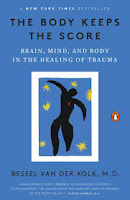Eight of us attended the book discussion of Sing Unburied Sing on Saturday Oct. 13, 2018. The book was so haunting but extremely well written. We all agreed that this book is very much like a Toni Morrison book, which in my opinion is the highest praise a writer could receive. Connie went as far
to say that Sing Unburied Sing reminded her of Sula and Song of Solomon.

Three of the women who attended on Saturday were
first-timers. One was Sarah, who started the discussion with how much she hated
it when the children walked out of the door to take the road trip with their
mother. Another first-time attendee is
Laura, who said that this book was so unsettling that she couldn’t read it
before bed. Asadie said she had “questions” about what was happening in the
book. I think she meant that she found it curious that people who had already
died could be seen and heard and play an active role in the story.
Carla said she loved the writing and baby’s sickness really
pulled her in. The little girl needed so much love and her brother Jojo
delivered that love to her. Carla continued by saying the drug part was
sickening and stated “When Leonie said Given was there, I thought it was her
imagination.” Leonie could only see her brother Given, who was killed when a
teenager, when she was high.
Shelara called Leonie an arbiter of death. Sara said that
Michael got Leonie started on drugs. I thought whether Michael got her started
or not, something was wrong with Leonie before she even started the drugs. It
seemed that she needed to rebel against her parents, even from a young age.
Perhaps because her mom was a gatherer of herbs and a healer (what my Grandma
used to call a “root worker.”) This embarrassed Leonie and she said that her
school mates used to say her mother was a witch.
Because most of us were so insistent that Leonie didn’t have
a heart, she didn’t have a mothering instinct, she didn’t seem to love her
parents or her children, Connie, ever the voice of reason, stepped in and
explained to us that some people, even though it appears that they come from
loving parents, still lacked something. She told us that people need varying
degrees of demonstrated and stated love. Just because Mam and Pop seem so
morally upright to Jojo (and to us) perhaps they didn’t give Leonie the
emotional support she needed.
Connie further explained to us that trauma is often passed
down through our DNA. Perhaps Leonie suffered from collective trauma that had
been inflicted on her ancestors. Connie asked us, “Who would choose to be that
miserable? Leonie was preordained to be this way.” This led to the discussion
of a theory offered in the book called The
Body Keeps the Score: Brain, Mind, and Body in the Healing of Trauma by
Bessel van der KolK M.D.
In Sing Unburied Sing, not only the living suffer trauma but
ghosts cry out also. They want their stories told. Richie needs his story told.
It’s so interesting to me that when Kayla first sees Richie, she calls him a
bird. She had said “Birds, Birds” when she looked across the field at Parchman.
When Jojo looked, for a moment he saw the men in the fields bent over working,
then they were gone. This idea of people’s
spirits as birds stems from African folktales of “flying away” like the song “I’ll fly Away” and Milkman flying in
Toni Morrison’s Song of Solomon, and
in the story “The People Could Fly”
published by Virginia Hamilton.
When Jojo sees the tree with the branches filled with ghosts
on page 284 he actually thinks, “They perch like birds, but look as people.
They speak with their eyes: He raped me
and suffocated me until died I put my hands up and he shot me eight times she
locked me in the shed and starved me to death while I listened to my babies
playing with her in the yard they came in my cell in the middle of the night
and they hung me...”
Three year old Kayla is able to sing to them and grant them
the opportunity to finally rest in peace.



Comments
Post a Comment